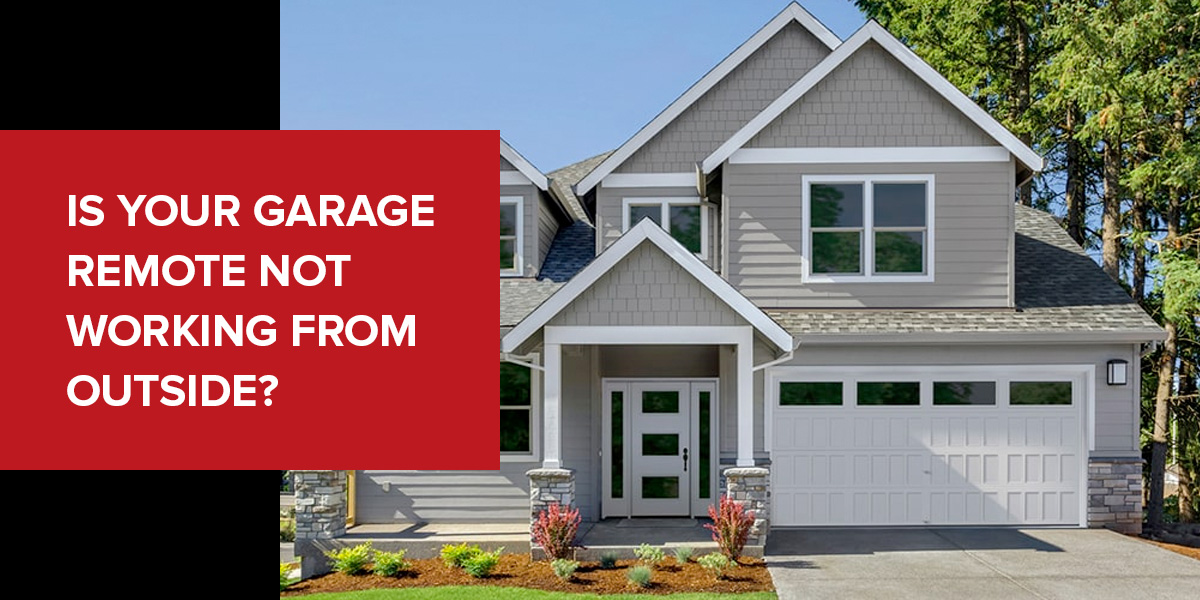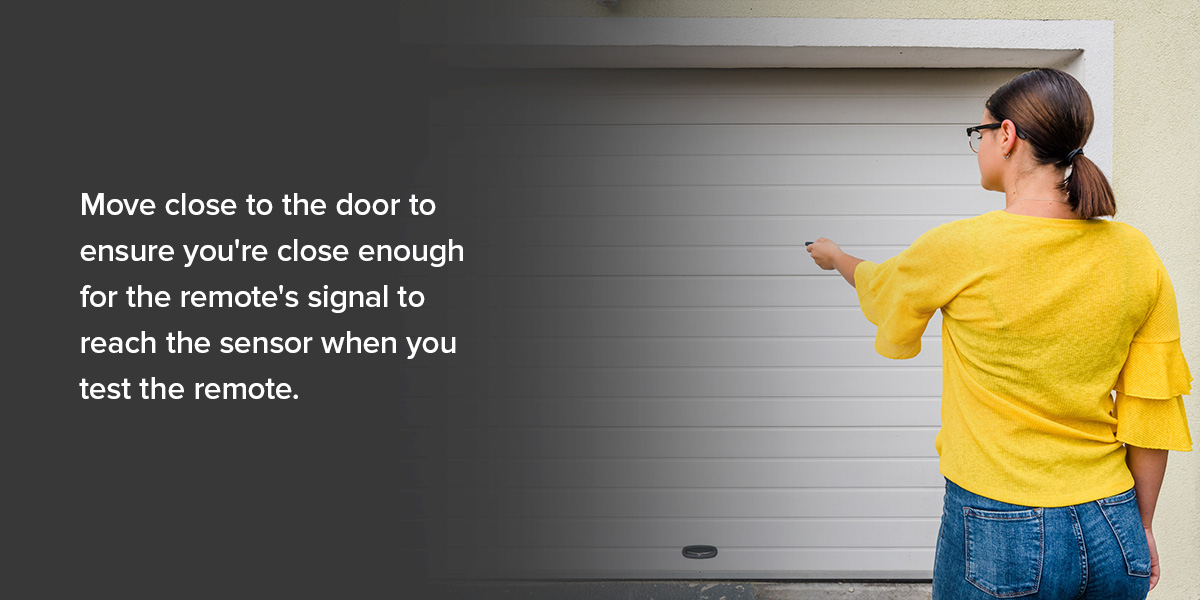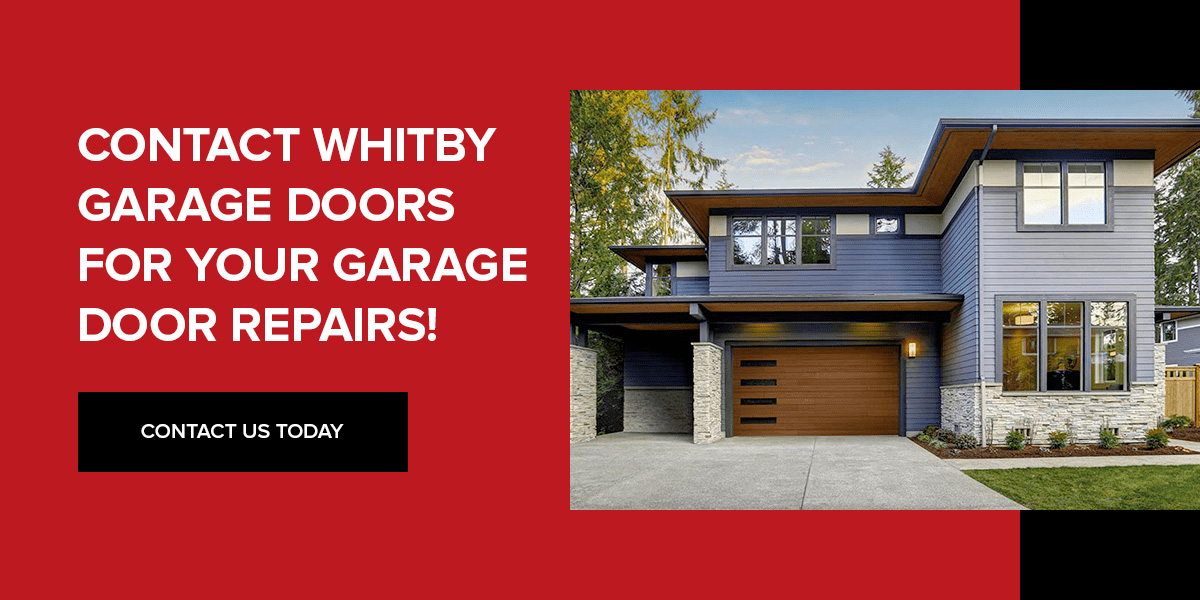Get Reliable Garage Door Service at Whitby Garage Doors
A recent article by CP24 highlights the need to thoroughly vet the companies that you use for garage door service and repair.
An Oakville-area woman was taken advantage of when she phoned a local company for an opener repair. They quoted her one price, and then presented her with a final bill of nearly $3,000, wouldn’t leave without payment, and didn’t give her an itemized receipt.
Unfortunately, this is a story we hear all too often. Many of our service customers will call us after they’ve had another company out to their home, only to be quoted a much higher price, and then intimidated by the representative on site.
At Whitby Garage Doors, we have a set price list for our services. If for some reason our tech gets on site and realizes that the service will be more expensive (for example, the opener needs to be replaced, or instead of a balancing issue, the real problem is that the spring needs to be replaced), our technician will get permission from the homeowner before starting work, as well as explain the reasoning behind the change.
Our pricing and invoices are transparent, and our techs will not require payment when they finish the service. The vast majority of our clients receive an invoice by email (unless they have asked for it to be mailed instead), and payment can be made by e-transfer or over the phone.
Our showroom at 10 Sunray St, Unit 20 in Whitby is open to the public, we’ve been in business since 2012, and our reviews on Google and NiceJob have thousands of honest reviews from our happy customers.
If you’re looking for an honest, reliable company for all of your garage door needs, look no further than Whitby Garage Doors!
Is Your Garage Remote Not Working From Outside?
Does your garage door remote work sometimes but fail to respond when you need it most? We understand that can be challenging, especially when you don’t know the cause of the malfunction.
As one of your home’s most frequently used entrances, your garage door undergoes a lot of wear and tear, leading to occasional issues. However, if the defect occurs more than usual, we recommend you contact an expert immediately to resolve the problem.
This comprehensive guide on troubleshooting your garage door remote and opener will teach you how the garage door remote works so you can understand what you’re dealing with. You’ll also learn how to resolve the problem when your garage door won’t open.
7 Tips for When Your Remote Won’t Open the Garage Door From Outside
Your garage door may have stopped working for various reasons. While you can fix most of these issues with minor adjustments, like changing the batteries, others may require closer attention.
Problems with garage doors opening often start with the remote. Garage door remotes use radio technology to operate. The remote control is a transmitter, sending signals to the garage door opener’s built-in receiver. When you press the button, the remote transmits a radio signal specific to that remote.
Any interruption within this process may prevent the garage door from working. Knowing the cause of the defect can help you determine what action you should take.
1. Check the Remote Battery
Garage door openers need a functioning battery to operate correctly. If the remote suddenly stops working, you may need to replace the battery. Signs that the battery needs a replacement include slow or intermittent responses as well as a failure to open altogether.
Before you open the remote, test it by standing in different positions. If your remote has an LED light, press the buttons to see if it lights up. The opener’s motor unit is responsible for opening and closing the garage door — hold the remote next to the motor unit to see if it responds.
If the remote’s LED light stays dark and the garage door ignores your instructions, check the manufacturer’s instructions to find what type of battery your remote needs. Replace the old batteries and test the remote again.
2. Check the Remote Signal
If your garage door won’t open with the remote even after changing the battery, the signal may be disrupted between the door sensor and the remote. There are several explanations for this:
- The remote control may be out of range.
- There might be an obstruction.
- The remote’s antenna could be faulty.
Move close to the door to ensure you’re close enough for the remote’s signal to reach the sensor when you test the remote. If the remote still doesn’t work, remove any obstacles. Besides physical structures, electronic appliances emitting signals at the same frequency could also block the garage door from working. In rare cases, the radio interference could be from miles away.
You can perform the power down test for your home to find other devices competing with your garage door and locate the source of the interference:
- Use an extension cord to plug the opener into an electric outlet inside your home.
- Locate the circuit breaker box and shut down the power to your garage.
- Stand at various distances and test the remote to see if the range improves.
- If the range improves, unplug all devices in the garage.
- Turn the breaker back on and plug in the devices one at a time to test if they reduce the remote’s range.
- When you identify the devices causing the interference, remove them from the garage or purchase a garage door opener that operates on a different frequency.
The last thing to do is check the antenna. See if the antenna points towards the door and ensure it’s still intact. Clean away any excess debris and try the remote again.
3. Check the LED Lights
LED lights may also disrupt the wireless signal from the remote control. Low-quality LED lights sometimes interfere with the frequency, causing the following problems:
- The remote control or keypad closes the garage door but cannot open it.
- The remote control only works when it’s close to the garage door opener.
- The remote control fails to respond altogether.
- You’re unable to program a new remote control or keypad.
Use bulbs within the recommended wattage and refer to the product manual for the correct size. You’ll also want to avoid halogen, short-neck or specialty light bulbs.
4. See if the Lock Button Is Engaged
If your garage door has a control panel mounted on the wall, there may be a lock button that prevents it from opening. It’s common to accidentally engage the lock feature or forget that you’ve turned it on intentionally. Check the lock system on the control panel and try opening the door with the remote.
5. See if the Remote Is Damaged
While durable garage door remotes can last a long time and survive several falls and impacts, they aren’t indestructible. Some damages are easy to ascertain, especially when the remote physically breaks. It could also be that the defect is on the inside.
While you may be able to fix some faults, it’s often best to replace your remote control. Keep the new remote away from intense weather conditions that could affect it, and always position it safely to avoid falls.
6. Reset the Remote
If your garage door is not opening, regular usage may have caused the remote to disengage from the opener. Reprogram the remote control to fix this problem:
- Locate the “learn” button on the opener, on the same side as the antenna — you may have to remove the light lens to access it.
- Press the button (don’t hold down for longer than several seconds as it will erase all previously programmed remotes/keypads).
- Within 30 seconds, press the button you wish to program and hold for three seconds, then release.
When the LED lights turn off, and the garage door’s operator lights start to blink, the reprogramming is successful. You can now test the remote to see if it works.
7. Check for Wiring Malfunction
Power surges may cause door control wiring malfunction. To test the wiring’s quality:
- Unplug the openers and disconnect the wires from the control panel and motor.
- Reconnect the machine and wipe the memory.
- Reprogram the remote controls, then reconnect the motor and control panel.
- Test the door with the remote to see if it works.
Contact a professional to inspect and diagnose the opener’s circuit board.
3 Other Reasons Your Garage Won’t Open From Outside
Although people often blame the remote control, there may be other reasons your garage door won’t open. Let’s consider these three common issues:
1. Broken Spring
The garage door could be too heavy to open if you have a broken spring. Broken springs strain your opening mechanism and make the door difficult to open or close safely.
Replacing your springs is the best solution. For safe and proper installation, you should always contact a professional.
2. Broken Cable
Garage door cables contribute to the door’s counterbalance system and need regular maintenance. A weak cable may cause the door not to close entirely on one side or jerk or make noise when you operate it. When the cable snaps, one side of the door may lift while the other stays closed. If the door is unresponsive, then it could be that the door is too heavy to open with only one cable.
Contact your local, trained garage door cable professionals to help you fix the problem and bring your garage door back to life.
3. Stripped or Broken Gear
You may press the remote and hear a humming sound from your garage door opener, but nothing happens. Although you don’t see any movement, the noise indicates that the motor is turning. In this case, you likely have a stripped or broken gear.
White shavings on the floor beneath the opener or inside the garage door case will confirm that you need to replace the gear. Most gears include instructions and grease packets to assist you with the installation.
Contact Whitby Garage Doors for Your Garage Door Repairs!
Garage doors remote systems offer convenient access to your property. It’s therefore essential to ensure they’re working at all times. It’s common to have occasional malfunctions, but when the defects prevail, troubleshooting may be able to get your door working again. If the problem persists and your garage still won’t open from the outside, consult a trusted professional instantly.
Whitby Garage Doors is a local garage door company serving Whitby, Ajax, Bowmanville, Brooklin, Coburg, Newcastle, Oshawa, Pickering, Port Hope, Port Perry and Uxbridge. We deliver quality services at competitive prices. Do you have a challenge concerning your garage door? Contact us today and take advantage of our reliable services.
Garage Door Makes Loud Noise When Opening
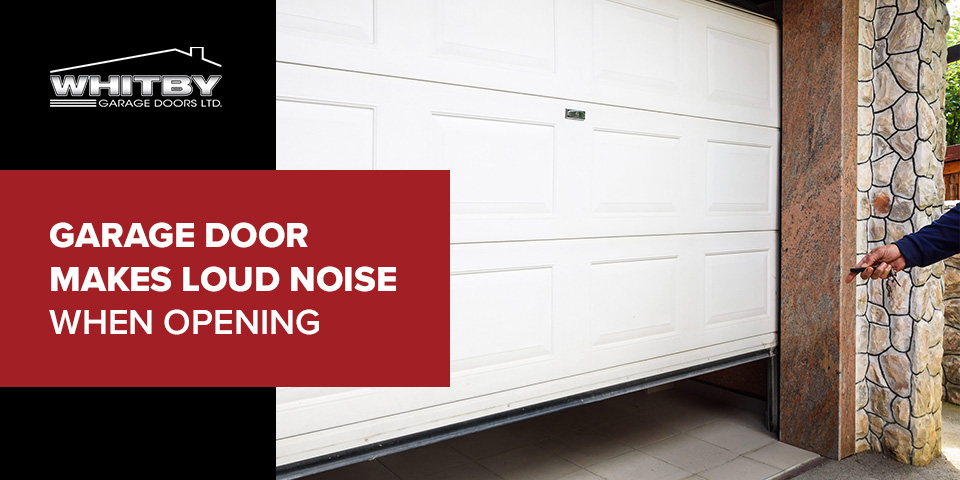
You rely on your garage door to access your house multiple times daily. When your garage door starts making banging sounds while opening and closing, you might have a serious issue on your hands. Regular wear and tear can cause garage door springs to break or fail, leading to loud noises and preventing your door from working correctly. If you’re experiencing banging sounds with your garage door, springs might be the problem.
Use this guide to learn more about fixing a noisy garage door and broken springs.
Why Is My Garage Door So Loud When Opening?
It’s normal to hear some noise when using your garage, especially if it’s an older build. However, if the garage door bangs when opening or closing or makes other loud sounds like straining, it could be a sign of something wrong. Sudden loud or unusual sounds could indicate several problems that need immediate attention.
Spring issues are common reasons garage doors make banging noises. The springs could have broken, lost torsion or they might need lubrication. Some springs may just have normal wear that require maintenance or adjustment. If you suspect your garage door springs are causing performance problems, loud noises or you heard a loud bang, contact a professional for help immediately. Garage springs are powerful and can be dangerous if handled improperly.
Why Are Garage Door Springs Important?
Garage doors are large, heavy objects made out of wood or most commonly a galvanized steel with an insulated polyurethane core. Springs make lifting the garage door manually and automatically easier and safer. Garage doors have two main types of springs — extension and torsion springs — which help open and close the heavy door. Torsion springs are typically found on the wall over larger garage doors and are most commonly used. Extension springs sit on the sides or above the horizontal tracks and are used less often due to performance issues.
Without these springs, you would have to manually open and close the garage door and all of its weight, which is dangerous and may leave your garage at risk for unwanted entry. This heavy weight will also strip your garage door openers gear.
Signs Your Garage Door Springs Need Repair
Once you start noticing issues like stalled performance or abnormal noises, perform a visual inspection of your garage components to try and identify if the springs are causing the problem. Some signs of damaged or broken springs are when the garage door:
- Makes banging noise when opening and closing: If your garage door bangs when closing or opening, you could have a broken torsion spring. The spring could be causing the sound as the door hits the floor, leaving the door without the tension it needs to open and close correctly.
- Won’t open at all: If your garage door doesn’t open at all, the springs could be the cause. Don’t try to force the door open if it wants to stay shut — you could get injured.
- Opens and closes with resistance: If you manually open your garage door and it’s suddenly much harder to open, it’s usually the springs. The springs aren’t taking the weight correctly and will need repair or replacement.
- Hear a loud bang: If you hear a loud bang coming form the garage it most likely means the spring has broken. This will also drop the cables off the drums and you will see loose or dangling cables on both side of the garage door. Do not try to open your door, it will only cause more issues.
Springs can cause many garage door problems, so carefully inspect the door systems. To help prevent spring issues, check your garage door springs and other components monthly, if possible. Regular visual inspections can help you catch problems early before they become expensive replacements. Avoid handling the springs yourself to reduce the chances of injury and door damage.
Ways to Fix a Noisy Garage Door
You can fix some garage door issues yourself if you work carefully. More complicated repairs should be left to professionals, as garage doors are heavy and can cause harm. You can perform minor tuneups every spring in addition to these fixes to help maintain your garage door. If you feel confident handling minor repairs, here are some possible solutions for your garage door problems:
Lubricate the Door
If you hear squeaking sounds or other noises, your garage door might need lubricating. The hinges, bearings, pulleys and rollers could cause squeaking or grinding if they have too little or no lubrication to make movement easier. Check the garage components for damage and rust and apply a garage door lubricant to the necessary sections. Consider replacing your rollers with nylon rollers, which don’t need lubrication, to help reduce the amount of lubrication you need for your garage.
You should also regularly lubricate your springs, especially torsion springs. If the springs can’t move smoothly, it can lead to the garage door making banging noises while operating. Once you’ve applied lubricant to the squeaky part, continue lubricating your garage door parts regularly. This keeps them working smoothly and quietly while preventing damage to your door.
Clear the Track
Sometimes debris or dirt can build up on the track, blocking it from working correctly and causing unusual sounds. In addition to regularly lubricating your components, keep them clean and clear. Any buildup can lead to blocks, further damage or expensive repairs. Clean out tracks and sections before regular lubrication to help maintain the garage.
Tighten the Nuts and Bolts
Loose screws and bolts can cause loud noises as well. These are often easily fixed with tightening. Take a wrench and socket and retighten the noisy components. Be careful not to over-tighten the nuts and bolts — this can lead to stripping or other damage. Always disconnect your garage opener to prevent the door from opening while working on it.
When to Call a Professional
If you’ve lubricated your garage door springs, cleared the tracks of debris, tightened loose nuts and bolts and still have trouble with your garage, it might be time to contact a technician. If you have broken springs or can’t find the cause of the issue — leave the garage door alone. Garage doors are heavy and broken springs can lead to serious injuries if handled without professional training.
Never try to replace springs yourself. Springs are under constant tension and have a lot of power stored up. A spring can break suddenly, hurting you or damaging the surrounding area. Metal spring pieces are sharp and could hurt your face, skin or eyes.
If you have a broken garage door spring, schedule a repair with a technician immediately. On a double-door replace both springs even if only one is broken. The load of the door is balanced upon both springs, meaning if one went the other will break shortly after. The longer you wait, the more expensive repairs can get, so don’t wait to call.
Trust Whitby Garage Doors for Spring Repair
Don’t leave your garage door damaged — contact a professional garage door service for top-of-the-line repairs and replacements. At Whitby Garage Doors, our technicians have the experience and training to quickly and safely repair and replace your garage door springs. Trust our team to deliver high-quality garage door services so you can return to using your garage door.
Contact us to request a service today!
Why Is My Garage Door Opening on Its Own?
Have you noticed your garage door opening and closing by itself? While this can be an annoying issue, it also poses security concerns. When your garage door continually opens and closes on its own, it can leave your property vulnerable to intruders and make it difficult for you to control your energy costs. You might also deal with pests or animals freely roaming your garage.
Luckily, this is a common issue that professionals can fix. Learn how to find the source of the problem, discover troubleshooting tips and see how experts can quickly get your garage door back in working condition.
Why Does My Garage Door Keep Opening By Itself?
While some garage door problems require a quick fix, others need to be addressed by professionals. Without further ado, let’s get into eight possible reasons your garage door keeps opening on its own:
1. Old Transmitter Buttons or Remote
If you’ve gotten home and discovered your garage door has opened itself, one of the first things you can do is check your remote buttons. You’ll find that debris can get caught between the buttons on your keypad, wall control or remote control operator and cause the door to open randomly. If your transmitters are old, they might fail to work correctly and cause a malfunctioning garage door.
To fix the issue, remove any debris between the buttons, replace old batteries and use compressed air to remove dirt or dust from the circuit board. If none of these methods work, you’ll need to call a professional to replace the remote and get your garage door back in working condition.
2. Your Opener Limit Settings Needs Adjusting
Does your garage door only reach halfway when you attempt to open or close it? Does your door go in the opposite direction after making contact with the top or bottom? If so, you may need to adjust your limit settings.
Your limit settings tell the garage door how far it needs to go up to completely open and how far down it’ll need to go to close. If you suspect your limit settings are incorrect, a professional can reset them so your garage door opens and closes properly again.
3. Damaged Electrical Circuits
As a result of a power surge or outage, the electric circuits that control your opener system might be damaged and cause your garage door to open and close erratically. It’s essential to call a garage door technician to inspect the circuits if you suspect weather events or electricity issues are to blame for the problem.
4. An Unsuspecting Neighbor
If your garage door remote was made before 1993, you’ll be surprised to know your neighbor could be opening your garage door unknowingly. Older remotes are programmed to respond to a signal on a specific frequency — between 300 and 390 megahertz — which means there’s a chance someone on your street has a garage door remote set at the same frequency as yours.
There’s also a rare chance you have a newer model programmed to your neighbor’s garage door. If you have an LCD panel, you’ll be able to see if anyone in your surrounding area has the same frequency remote as yours so you can erase your remote’s history and reprogram the transmitter. You can do this by reading the instructions on your owner’s manual or calling a professional.
5. Debris or Obstructions
Your garage door has a feature known as a reversing mechanism, a sensor located near the floor of your garage next to where the door closes. The sensor is designed to keep people safe by reversing the garage door’s motion if it senses something is in the way. While an excellent feature, the garage door may open and close on its own if the sensor identifies any obstruction, no matter how small.
Search for any sticks or rocks that might be close to your sensor that could be preventing it from closing. Also, ensure weather buildup and debris haven’t caused interference in your door’s operation. A professional can inspect and fix anything that might be triggering your reversing mechanism and ensure your garage door properly opens and closes.
6. Misaligned Safety Sensors
If you find that clearing debris from your sensors doesn’t solve the problem, you may have a misaligned sensor. Typically, you’ll have two sensors close to the bottom of your garage door connecting across a beam of light. If they become misaligned, the light can get interrupted and trigger the reverse mechanism to open the door, even when there are no obstacles in its path.
If you notice the green LED on your sensor is off, dim or flicking, you’ll need to have your sensors realigned by a technician.
7. Damaged Control Wiring
A garage door that randomly opens and closes could indicate a problem with the electrical wiring. If you look around your garage, you might notice a wire running from the motor unit of your opener to the mounted wall control. Other wires travel from the motor unit to both door photosensors. When the circuit shorts or has bare spots, the garage door can open and close on its own.
Staples, nails and even mice can pierce the wires and cause bare spots. In the event of control wiring damage, you’ll need to have a technician fix the problem since working with electric wires can be extremely dangerous.
8. Circuit Board Malfunction
Your garage door circuit board ensures all signals from your remote or wall panel reach the door to open and close it properly. When damaged, the door might open and close on its own. You’ll want to enlist professionals to inspect the circuit board to repair or replace it.
To diagnose the problem, professionals will first test the wiring on your receiver board and disconnect the wires on your motor and control panel. Then, they’ll attempt to reconnect or replace the cables. Since this might not restore your door’s functionality, it can be more cost-effective to replace the opener altogether rather than attempting to replace an outdated model.
Call Whitby Garage Doors If Your Garage Door Opens on Its Own
The last thing you want is a malfunctioning garage door that could invite pests or intruders into your home. When you’re unsure what’s causing your garage door to open and close on its own, enlist the help of your local garage door technicians to diagnose and fix the issue.
Whitby Garage Doors offers same-day service, honest repairs and competitive prices to fix or replace your garage door opener. Our highly skilled technicians are excited to work with you to get your garage door back in working condition.
To schedule garage door maintenance, contact us today.
TO OUR VALUED CUSTOMERS REGARDING COVID-19 (CORONAVIRUS)
First, we would like to say thanks to all our customers. We’re all in this together, and our actions will determine how we rebound from this pandemic.
We are open for business to keep our customer’s garage doors operating during these difficult times. We ask that you respect our policies as we will, in turn, respect yours and your home.
We are doing everything in our power to stop the spread, this includes:
- The closure of all our 4 showrooms.
- Parts sales will be paid in full by phone or email, parts will be left at the door for customer pickup.
- Sales calls will be performed by email or by phone with a no-contact policy. If the sale is to proceed our sales staff will do an onsite measurement in your garage with 0 interactions. All we ask is you open the garage for our sales staff we will let you when our measurements are complete.
- Service calls and installs will continue our clients must not be in the garage while our technician is completing the work.
- We will wipe down the push button and any other touch-points that our customers will use in their daily routine.
- Our Employees are exercising social distancing both at work and at home, following all government and company guidelines.
We appreciate your support and look forward to welcoming you back into our showrooms as soon as possible.
To protect yourself and others, we ask that anyone who is feeling unwell, or anyone who has travelled internationally, to call us at 905-665-8668 to cancel your service call or new garage door and/or opener installation.
If you have any questions or if you want to reschedule your appointment, you can call us at 905-665-8668.
Thank you and we look forward to seeing you soon,
Whitby Garage Doors Ltd.
5 Ways to Get Your Garage Door Ready for Winter
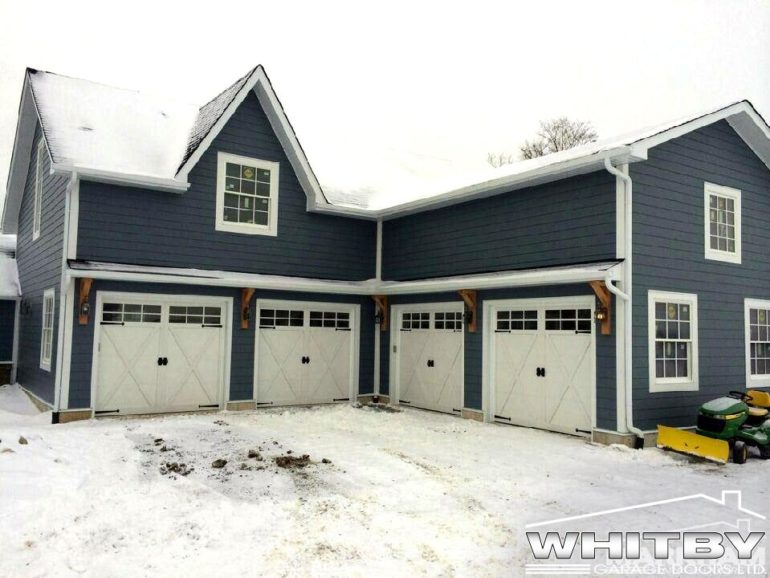
As we write this post, new record high temperatures are being set for Whitby and the GTA in early September. The long range forecast doesn’t show any daytime temperatures below 20 degrees. It feels more like June than September.
But September it undeniably is. The beginning of autumn and cooler temperatures. The precursor to winter.
It may not seem like a time to prepare anything for the onslaught of ice and snow, but it’s better to prepare your garage door for winter now than when the ice and snow actually arrive.
5 Steps to Prepare Your Garage Door for Winter
The last thing you need is for your garage door to stop working at the height of a blizzard. The following steps will help keep it in peak working condition throughout the winter.
1. Check the Operation of the Door
This one’s easy, unless there’s a problem. Whether it’s manual or you have a garage door opener, open and close the door. As you do check to make sure it moves up and down evenly, with it’s bottom edge remaining parallel to the garage floor. Also listen for unusual squeaks and sounds, particularly grinding noises from your garage door opener.
2. Tighten Connections
The panels of your garage door are connected to each other by bolted hinges. And the door is connected to it’s tracks through the rollers on each side. Check and tighten all bolts in these connections.
3. Lubricate the Weather Seals
The rubber seals between each panel, along the bottom of the door and around the door frame should be lubricated to keep them from sticking, freezing together and cracking.
4. Lubricate Moving Metal Parts
The garage door’s hinges, cables, springs and rollers should all be lubricated to keep them running smoothly.
5. Test the Safety Systems
You should do this at least twice a year and the autumn is as good a time as any. If you have a garage door opener, it has two safety systems. One will reverse the door if the door strikes anything as it closes. The other will reverse the door if anything crosses its path while it is closing.
To test the first safety system, place a 2X4 on the garage floor where the door meets the floor. Close the door. It should stop and reverse when it hits the 2X4. To test the second system, use a stick to push an empty cardboard box into the path of the door as it closes, while you remain well away from the door’s path. The door should stop and reverse as the cardboard box moves between the two photo eyes on either side of the door opening.
To learn more about keeping your garage door and opener it tip-top working condition, call Whitby Garage Doors at 905-665-8668.
3 Garage Floors That Stand Up to Anything You Throw At Them
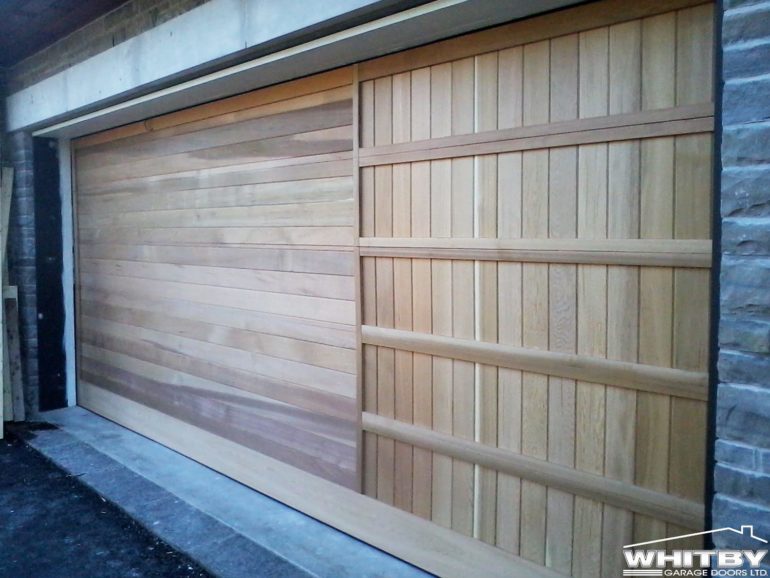
What is cracked, chipped, has grease stains and paint splatters.
Give up?
Your garage floor.
And, unfortunately, that’s no joke. If there was an award for the one part of your house that is most neglected, your garage floor would at least be on the running every year. Heck, it would be lucky to get swept once a year.
But that doesn’t mean you’re a bad homeowner. Garage floors are bare concrete. Concrete is notoriously difficult to clean. Whether in the basement or garage, we wouldn’t think twice about leaving a paint spill on a concrete floor instead of wiping it up. But you can’t say that about any other floor in the house.
Winter also has its own surprises for your garage floor. Especially the salt and dirt that get trapped in the snow and ice that clings to the wheel wells on your car. Once you drive into your garage, it’s only a matter of time until the brownish concoction melts enough to hit the floor. Then it leaves white salt lines on your floor as the moisture evaporates.
But it doesn’t have to be that way.
Options for Garage Floors that Stand Up to Just About Anything
By showing your garage floor a little love and attention, it’ll reward you with great looks and easy cleaning of anything you can throw at it. You’ll have to properly prepare the floor before using any of the following options.
1. A Coat of Paint
Applying a coat of concrete paint to the floor is probably the fastest and easiest way to improve your garage floor. It bonds with the concrete. A few solid coats will help the floor last much longer.
2. Apply an Epoxy
Epoxy, polyurea and polycuramine coatings offer the toughest floor protection with the ease of paint-on application. These coatings can even be chemical and acid resistant. And they are available in a wide variety of colours and finishes.
3. Floor Tiles
Ceramic or porcelain tiles are not only the most durable flooring for your garage, but the best looking too. Be ready to apply a levelling layer of concrete before tiling the floor.
Not only will you keep a coated garage floor cleaner, but you’ll also begin to see options for your garage beyond just using it as a place for your car.
Give Yourself the Gift that Keeps on Giving – A New Garage Door Opener
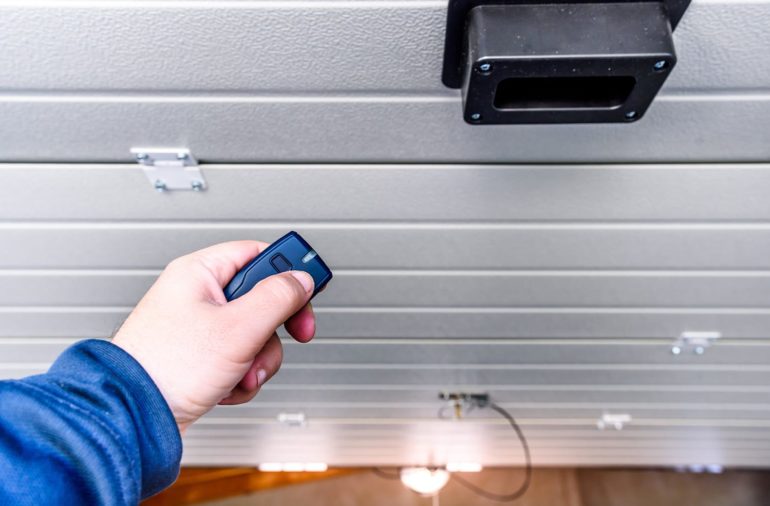
How many Christmas gifts will you get this year that you will use every day? In a related question, would anyone ever give you a new garage door opener as a gift? Add it all up and, if you want a gift that you’ll appreciate every time you drive out of or into your garage, get yourself a new garage door opener.
But, wait, your old opener is working just fine. It’s been there since you moved in. Why would you waste a perfectly good gift opportunity (especially since it’s for yourself!) on a new garage opener?
It’s a good question. If there’s one ‘problem’ with most good quality door openers, it is that they seem to last forever.
5 Reasons to Get a New Garage Door Opener Even if the Old One Still Works
Here’s why you should think about gifting yourself a new garage door opener this year.
- Safety – There are a remarkable number of 25- and 30-year-old openers still faithfully lifting and lowering garage doors. That’s great until you realize that, while they are working well, they are missing safety systems, like photo-eyes, which were not common on garage door openers until the mid-1990s.
- Your Current Door Opener Won’t Last Forever – Maybe it’s already broken down and been repaired. In any case, openers don’t last forever. And you can bet they’ll finally call it quits at the worst possible time. The clock is ticking…..
- Peace & Quiet – If you can tell when someone comes home, even when you’re in the basement, your garage door opener is too noisy. You might not realize the ruckus your opener causes until you hear (or not) the quiet operation of a new one.
- Battery Backups – If you’re still opening and closing the garage door manually every time the power goes out, get a new opener. Battery backups can give you as many as 10 open/close cycles when the power’s out.
- Get Connected – Just like about everything else in your house, garage door openers have joined the list of appliance you can control from your smartphone. Except, compared to finding out that your clothes are now dry, it’s actually quite useful to learn that your door has just been opened by someone and you’re not home.
If you’d like to learn more about why you should get a new garage door opener for yourself this year, contact Whitby Garage Doors today.
4 Ways to Make Your Garage More Environmentally Friendly
How many things have you done to make your home and garage more environmentally friendly? Probably more than you think to your home. That’s because the added bonus of changes to make your home ‘greener’ is that you also save money in energy costs and fewer maintenance and repair costs for your heating and air conditioning equipment.
But most homeowners don’t take similar steps to make their garages more environmentally firendly and energy efficient. In a way, that’s odd because garages can be among the biggest sources of energy waste in the home. While they can be as cold as it is outside in the winter, and as hot as it is outside in the summer, the idea that garages are ‘inside’ means many of us don’t take the same steps to make them more energy efficient as we do elsewhere in the house.
But making your garage more environmentally friendly helps make your entire house more energy efficient too. Here are just a few things you can do to have a more environmentally friendly garage.
1. Use CFL & LED Lighting
By switching the lights in your garage to CFLs and LEDs, not only will you reduce your electricity use and costs, your garage will probably be better lit than it was using incandescent and neon lighting.
2. Add Insulation
Especially for garage walls and ceilings that are shared with the home, insulating them will reduce your energy costs and make your home more comfortable too.
3. Get an Insulated Garage Door
Even if the rest of your garage is well insulated, an uninsulated door wastes a lot of energy and lets more heat and cold get into your house.
4. Maintain Your Garage Door Opener
Your garage door opener might work really well, but that doesn’t mean its working efficiently. If there is anything interfering with the easy opening and closing of the door, like sticking rollers or being out of balance, your door opener can be using extra energy every time it operates.
Regularly check that your door opens and closes easily by disconnecting the opener and operating the door manually.
If you want more tips to save money by making your garage more environmentally friendly, give us at 905-665-8668.
3 Places to Find Inspiration for Renovating Your Garage
If you’re the type of homeowner who doesn’t renovate or redecorate as often as others, it’s might not be for lack of desire. Many people have a difficult time deciding on a direction for their renovation/redecoration projects, or even knowing what’s possible, and they end up putting it off until some sort of inspiration strikes them.
One of he problems is that many of the places we look for ideas, like architectural magazines and websites, don’t always show homes like the ones we live in. That makes it difficult to know if and/or how the idea will work in our home. And, in the case of something like a garage door, there doesn’t seem to be anywhere to find lots of great ideas, other than a manufacturer’s website – and, of course, all the doors there will look fantastic.
But fear not. Here are three places on the web where you can find virtually endless images of garage doors, openers, interiors, floors, storage, etc., (and of any other room in your home), many of them from real homes just like yours.
1. Houzz
If you haven’t heard of Houzz, it’s designed to give you ideas and inspiration for interior home design and renovations. Without over 15,000,000 images online, you’re bound to find more than a few ideas for your garage.
2. Pinterest
If you want to find images of anything, including garage doors Pinterest is the place. And you’ll also find images and links for just about everything to do with your garage, from door hardware to storage ideas.
3. ca
This is the place to find garage door ideas that are most suitable for your home. How so? Because you can use it to check out real estate listings here in Whitby, right in your neighborhood, where you’re more likely to find homes of a similar style to yours.
When you’re ready to install your new garage door (or you still need more ideas) get in touch with us here at Whitby Garage Doors, we’re ready to help.


